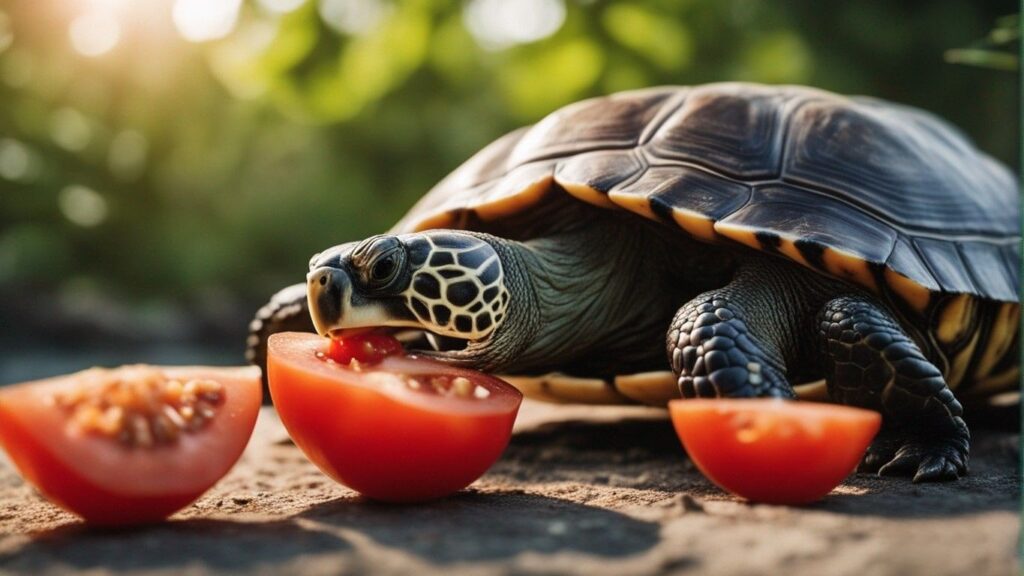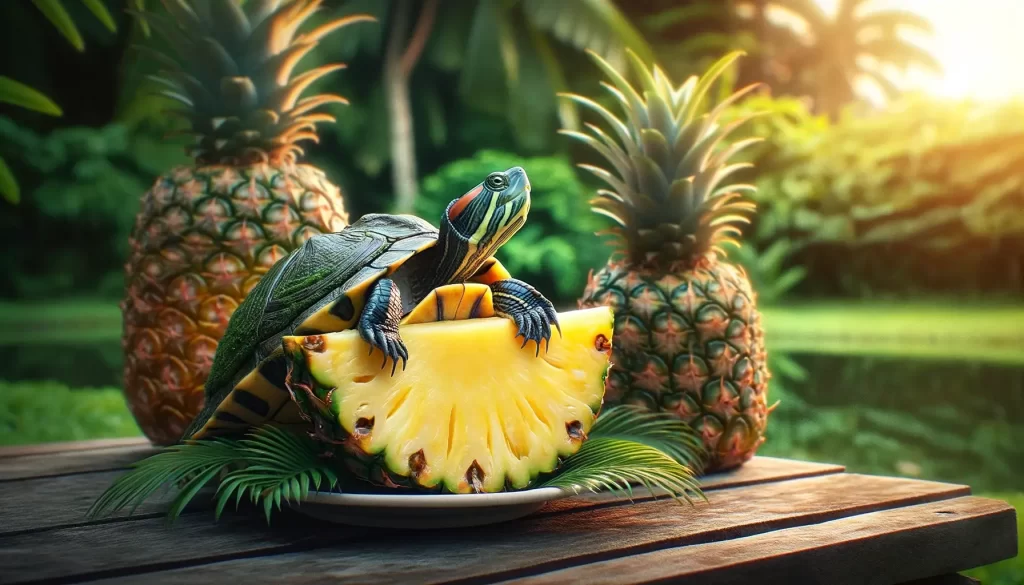Ever wondered if turtles can enjoy a delicious snack of tomatoes? Well, you’re in luck! In this article, we’ll explore whether or not turtles can have tomatoes.
From their natural diet to potential risks and benefits, we’ll uncover the truth behind this intriguing question. So, grab a seat and let’s dive into the world of turtles and tomatoes!
Suitability of Tomatoes as Food for Turtles
Tomatoes are a popular and versatile fruit that can make a great addition to a turtle’s diet. However, it is important to understand the nutritional requirements of turtles and the components of tomatoes to determine their suitability as turtle food. In this article, we will explore the potential benefits and risks of feeding tomatoes to turtles, along with alternative food options and the importance of consulting a veterinarian for professional advice.
Nutritional Requirements of Turtles
Before discussing the suitability of tomatoes for turtles, it is crucial to understand the essential nutrients that turtles require for optimal health. Turtles are omnivorous reptiles and their diet should consist of a balance of protein, carbohydrates, fats, vitamins, and minerals.
Calcium and Phosphorus
Calcium and phosphorus are vital for a turtle’s bone and shell health. These minerals are especially important for growing turtles and female turtles during the reproductive period. Inadequate calcium intake could lead to metabolic bone disease, a serious condition that can affect a turtle’s overall well-being.
Vitamin A
Vitamin A is essential for maintaining good eyesight, immune function, and healthy skin in turtles. A deficiency in this vitamin can lead to eye problems and a weakened immune system, making turtles more susceptible to infections and diseases.
Vitamin C
While turtles can synthesize their own vitamin C, it is still important to provide them with dietary sources of this vitamin to support their overall health and immune system. Vitamin C is a powerful antioxidant that helps protect cells from damage caused by free radicals, and it also plays a role in collagen synthesis.
Fiber
Fiber is crucial for turtles’ digestive health and helps regulate their bowel movements. It aids in the digestion and absorption of nutrients, prevents constipation, and provides a sense of fullness.
Water
Turtles need access to clean and fresh water at all times to stay properly hydrated. Water plays a vital role in maintaining their temperature, aiding digestion, and supporting overall physiological functions.
Components of Tomatoes
Now that we understand the nutritional requirements of turtles, let’s take a closer look at the components of tomatoes to determine their nutritional value for turtles.
Macronutrients in Tomatoes
Tomatoes are low in calories and fat, making them a healthy option for turtles. They contain carbohydrates, which provide energy, and small amounts of protein, although turtles primarily obtain protein from other sources in their diet.
Micronutrients in Tomatoes
Tomatoes are a good source of essential vitamins and minerals such as vitamin C, vitamin A, potassium, and folate. These micronutrients are important for various bodily functions and contribute to the overall well-being of turtles.
Antioxidants in Tomatoes
Tomatoes are rich in antioxidants, including lycopene, beta-carotene, and vitamin C. Antioxidants play a crucial role in neutralizing harmful free radicals and protecting cells from oxidative damage.
Lycopene in Tomatoes
Lycopene is a powerful antioxidant that gives tomatoes their vibrant red color. It has been associated with various health benefits, such as reducing the risk of certain types of cancer and promoting heart health. While lycopene is not considered an essential nutrient for turtles, its potential benefits should be taken into consideration.
Potential Benefits of Tomatoes for Turtles
Considering the nutritional value of tomatoes, they can offer potential benefits to turtles when included in their diet.
Nutritional Value of Tomatoes
Tomatoes provide a range of essential vitamins and minerals that can contribute to a turtle’s overall health. The presence of vitamins C and A, along with potassium and folate, can support immune function, eye health, and the overall well-being of turtles.
Source of Vitamins and Minerals
Including tomatoes in a turtle’s diet can help provide necessary vitamins and minerals to meet their nutritional requirements. The presence of vitamin C contributes to the antioxidant capacity of their diet, while vitamin A supports healthy eyesight and skin.
Possible Antioxidant Benefits
The antioxidants present in tomatoes, including lycopene, beta-carotene, and vitamin C, can potentially offer protection against cellular damage caused by free radicals. This can support overall health and well-being, as well as potentially help prevent certain diseases.
Potential Risks of Tomatoes for Turtles
While tomatoes offer nutritional benefits, there are also potential risks that need to be considered before incorporating them into a turtle’s diet.
Toxicity of Solanine
Tomatoes belong to the nightshade family, which contains a compound called solanine. In large quantities, solanine can be toxic to turtles and may lead to gastrointestinal upset, neurological symptoms, or even death. However, the levels of solanine in ripe tomatoes are generally considered safe for consumption.
Digestive Issues
Turtles have different digestive systems compared to humans and may not be able to efficiently digest certain components of tomatoes, such as seeds or skin. Ingesting large amounts of these parts may lead to digestive issues, such as blockage or irritation.
Allergic Reactions
Some turtles may develop allergic reactions to certain foods, including tomatoes. Allergic reactions can manifest as skin irritations, respiratory symptoms, or digestive disturbances. It is important to monitor your turtle for any signs of allergic reactions when introducing new foods, including tomatoes.
Feeding Tomatoes to Turtles
If you decide to feed tomatoes to your turtle, it is important to do so in a responsible and safe manner.
Importance of Variety in Turtle Diet
Turtles require a varied diet to meet their nutritional needs. Tomatoes should only be a small part of their overall diet, alongside other suitable foods such as leafy green vegetables, non-toxic herbaceous plants, and commercial turtle pellets.
Frequency and Portion Size
Tomatoes should be fed to turtles in moderation. They should not constitute the majority of a turtle’s diet and should be provided as a treat or occasional supplement. A good guideline is to feed tomatoes to turtles once or twice a week, in small portions appropriate for the size of the turtle.
Preparation and Presentation
Before offering tomatoes to your turtle, it is important to remove any seeds and skin, as these parts can be difficult for turtles to digest. Chop the tomatoes into small, bite-sized pieces and offer them alongside other foods to ensure a balanced meal.
Monitoring Turtle’s Health
While tomatoes are generally safe for turtles, it is crucial to closely monitor your turtle’s health and behavior after introducing them to this food. Look out for any signs of digestive issues, allergic reactions, or abnormal behaviors. If you notice any concerning symptoms, it is recommended to consult a veterinarian for further evaluation and guidance.
Alternative Foods for Turtles
If you have concerns about feeding tomatoes to your turtle or want to diversify their diet, here are some alternative food options for turtles.
Recommended Foods for Turtles
Leafy green vegetables, such as kale, collard greens, and romaine lettuce, are excellent choices for turtles as they are low in oxalates and high in necessary nutrients. Non-toxic herbaceous plants like dandelion greens and water lettuce can also be included in a turtle’s diet.
Commercial Turtle Pellets
Commercial turtle pellets are specially formulated to provide a balanced diet for turtles. They typically contain a combination of protein, vitamins, and minerals to meet a turtle’s nutritional requirements. However, pellets should not be the sole source of food and should be supplemented with fresh foods for a well-rounded diet.
Consulting a Veterinarian
To ensure the best care for your turtle, it is always advisable to consult a veterinarian who specializes in reptiles. A veterinarian can provide professional advice tailored to your turtle’s specific needs and offer guidance on appropriate dietary choices, weight management, and avoiding potential health issues.
Professional Advice
Veterinarians have the knowledge and expertise to provide valuable insights into the nutritional requirements of turtles. They can assess your turtle’s current diet, evaluate their overall health, and make recommendations to ensure their well-being.
Specific Dietary Needs
Every turtle is unique, and their dietary needs may vary based on their age, species, size, and overall health. A veterinarian can help determine the appropriate balance of nutrients for your turtle and advise on any specific dietary considerations.
Weight Management
Maintaining a healthy weight is important for turtles. A veterinarian can assess your turtle’s body condition and recommend appropriate portion sizes and feeding frequencies to help manage their weight and prevent obesity-related health issues.
Avoiding Potential Health Issues
Consulting a veterinarian can help identify and address any potential health issues related to your turtle’s diet. They can advise on the proper selection and preparation of foods, as well as provide guidance on avoiding potential risks and ensuring a balanced diet.
Final Thoughts
In conclusion, tomatoes can be a suitable and beneficial addition to a turtle’s diet when fed in moderation and with proper preparation.
They provide essential vitamins, minerals, and antioxidants that contribute to the overall health and well-being of turtles.
However, it is important to be aware of potential risks, such as solanine toxicity and digestive issues. A varied diet that includes other suitable foods, alongside professional guidance from a veterinarian, will ensure that your turtle receives a balanced diet tailored to their individual needs.
Remember to always monitor your turtle’s health and consult a veterinarian for any concerns or questions related to their diet.
Treats, including tomatoes, should be given in moderation to maintain a healthy and well-rounded diet for your turtle.




